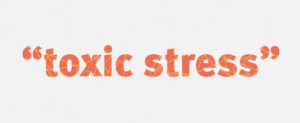 This week in the Neighborhood we’re highlighting an animated video (and some other handy resources) from our friends at Harvard’s Center on the Developing Child. Stress and Resilience: How Toxic Stress Affects Us and What We Can Do About It offers a straightforward definition of toxic stress and describes ways to manage it. The video may be helpful to you or to families you work with who are struggling with stressful situations. It’s available in English (with German subtitles) and Spanish. (You can also access the video on YouTube directly, in case you want to add it to your favorites.)
This week in the Neighborhood we’re highlighting an animated video (and some other handy resources) from our friends at Harvard’s Center on the Developing Child. Stress and Resilience: How Toxic Stress Affects Us and What We Can Do About It offers a straightforward definition of toxic stress and describes ways to manage it. The video may be helpful to you or to families you work with who are struggling with stressful situations. It’s available in English (with German subtitles) and Spanish. (You can also access the video on YouTube directly, in case you want to add it to your favorites.)
The Harvard site includes links to articles, activity guides, and an infographic for parents as well as resources for service providers and policymakers. The Center on the Developing Child is an excellent place to look first when you need credible, evidence-based information to share with families.
The ICC-Recommended Early Start Personnel Manual (ESPM) describes core knowledge and role-specific competencies needed for early intervention service provision, incorporating current research and evidence in the field of early intervention. To access the ESPM, click here.
This resource is related to the following ESPM knowledge-level competencies:
- Core Knowledge (CK):
- CK9: The characteristics and influence of disabilities and risk factors on early development, learning, caregiving, and relationships.
- Evaluation and Assessment (EA):
- EA4 (EIS): Knows strategies that support parents/caregivers in identifying and articulating their concerns about their infant/toddler’s development and needs.
- EA5 (EIS): Understands the effect of social context, child’s state of health and well-being, primary language ability, and environment on assessment processes.
- Individualized Family Service Plan Development and Review (IFSP-DR):
- IFSP-DR2 (EIS): Understands the concept of mentoring and its importance with parents and other IFSP team members.
- Individualized Family Service Plan Development and Review (IFSP-i):
- IFSP-i3 (EIS): Knows generic and specific evidence-based early intervention strategies to support all areas of development.
- IFSP-10 (EIS): Knows strategies that support parents in providing basic health, nutrition, and safety for infants and toddlers in natural environments.
